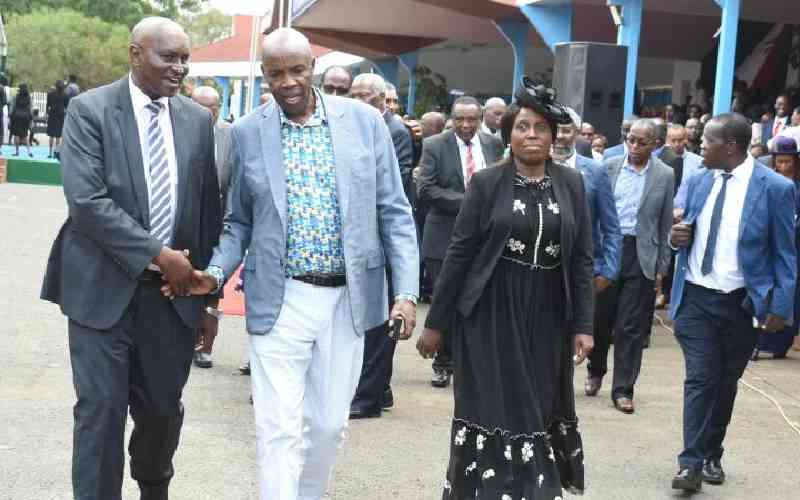The young lads, calculating and coldblooded, were so brave that their hideout was right across the fence from Nairobi’s Central Police Station. BY JOSAYA WASONGA
How do you hide from cops? You hide in plain sight. Right under their noses. This is exactly what a gang of robbers did. They lived and operated less than 10 minutes away from the city’s top cop shop; Central Police Station.
They were the famous Mamlaka gang. Born and bred in the Mamlaka B Hall of at the University of Nairobi’s main campus. Thing is, the name of the gang became famous only after they were caught. Their parents were probably sleeping easy at home. Proud of their hard working sons in the famed University. Unaware that their sons were part of a notorious gang that terrorized Nairobi residents. And they lived and operated from the right under the nose of everyone. And had it not been for a disgruntled gang member-turned-informer, the gang’s reign of terror would have gone unchecked for a long time. The gang consisted of two fourth-year students; Ouma and Babu H.G.; a third-year student, Mutunyi aka The Beast and a fourth-year student, Butali. The remaining members were not students; Mungai aka Brown who sold mobile phones at an exhibition stall in the city, Onyango aka Iron who lived in Nairobi’s Eastlands area and Mulinge aka Mengus who was an employee of Tana River Development Authority.
When Dennis Onsarigo did the story for his crime and investigative program, Case Files, he could not independently verify if Mutunyi was indeed a student at UoN.
Armoury
In Nairobi’s underworld, wizened gangsters do not go with their “tools of trade” to their homes. They look for someone who is not a gang member and will not attract suspicion from cops and members of the public, to store their guns for a fee. They may be ladies, school children, college students or just ordinary folk looking to make an extra buck, but without the guts to commit crimes.
These people now become the armoury. And most times, it does not end well for people who have been turned into an armoury.
But the Mamlaka gang was braver than most. They knew that making a getaway with the loot and guns to the city’s estates, their main playing field, was risky business, what with the gridlocks and roadblocks. Besides, who would suspect that one of Africa’s leading institutions of higher learning is being used as an armoury to store violent criminals’ cache of arms?
When the cops figured it out
Between 2001 and 2003, police in Nairobi were battling an alarming spate of crimes, which included robberies, rapes and murders. The carjackings were carried out in an upmarket area, a bank robbery in downtown Nairobi. After every crime, squads of police officers would be deployed to carry out what was known as a city lockdown. But somehow, some of the gang members also always evaded the police dragnets.
A city lockdown is basically rounding up any persons whom the cops deem as suspects. And in January 2003, an informer gave the cops a heads-up – which was their ‘aha’ moment - and they narrowed their surveillance to a patch of earth that has produced the brainiest people in Kenya.
The informer pointed out the group members, and they were all put under surveillance.
My life in crime
In his interview with Onsarigo, Mutunyi, one of the gang member’s spoke coolly about his life in crime.
“I was taking Education Science,” Mutunyi said. “But unfortunately because of peer pressure, and life’s calamities, we had to indulge in some acts that actually led me to getting involved in some of the robbery activities.”
Stay informed. Subscribe to our newsletter
“As early as 2001, I had already begun engaging in crime. I was arrested in 2003, because of a lot of deteriorating acts. We university was a hiding zone.”
“In the learning institution, nobody can realise that anything is taking place there. What happens is that, certain things are assumed. But in real sense, those are the dangerous zones.”
At the time, Bernard Ouma, a fourth year engineering student was occupying room number 9 in Mamlaka B Hall of Residence at the University of Nairobi. Onyango was known as the armourer; a man with the key to a deadly cache of arms that were later to be linked to a series of robberies in the city. Babu operated from another cubicle in room 19 in Mamlaka B.
Maiden heist
Mutunyi told Onsarigo that their first case was hijacking money that was being transported to a certain constituency. They took the safe and broke it in the hostel in the university. They shared the money and then dumped the safe far from the university.
For three years, the gang of five and other members perfected their art of camouflage; evading police dragnet, terrorising city residents and eventually, their crimes stretched past Nairobi.
Up and till the second week of May 2003, gangsters were wreaking havoc. Harrison Wafula, a former army major had been shot three times in the head as he made his way home in Ngei Estate. Kihara Waithaka, a prominent Democratic Party official, had been shot dead as he entered his home in Loresho. Around the same time, two foreign tourists had been shot and killed.
D-Day
May 16, 2003. Undercover detectives make their way to the hostels. They knock on room number 9. The door is locked. That night, the cops stay put. Ouma does not return to the hostels, but tries to make arrangements for the firearms in his room to be transferred to room 19.
The guards at the campus later tell the police that Ouma requested them to move the guns for him from his cubicle to room number 19 at a fee of Sh10, 000 shillings but they declined.
Butali agrees to move the deadly arsenal. At around 4AM, Butali sneaks into room number 9, packs up the guns and transfers them to room number 19. When this happens, the guards, who are on the lookout, call the police, who move in, but Butali somehow escapes.
Away from the public’s eyes, police had been trailing a group of university students they thought might be involved in the crimes. Days after a crime, they spotted a car they had been trailing make its way to Mamlaka Road. They police moved in and arrested five people, successfully rounding up the rest of the gang.
“They got me at gunpoint,” Mutunyi said. “So I could not do anything. I had to surrender and let the law play its role. There was only one way out, and it was very well covered by the policemen. I couldn’t escape.”
That morning, police arrested seven suspects, and recovered eight firearms.
Ouma and Butali were arrested a month later in Lokichogio. At the time of the interview, Mutunyi was a director of studies at Naivasha Maximum Security Prison.
The surviving members of the Mamlaka Gang were incarcerated at Kamiti Maximum Prison, where they are serving life sentences. One was lucky, while another was snuffed out forever. Ouma walked to freedom after serving a five-year term for being in possession of firearms while Babu was gunned down in 2009 in the city.
 The Standard Group Plc is a
multi-media organization with investments in media platforms spanning newspaper
print operations, television, radio broadcasting, digital and online services. The
Standard Group is recognized as a leading multi-media house in Kenya with a key
influence in matters of national and international interest.
The Standard Group Plc is a
multi-media organization with investments in media platforms spanning newspaper
print operations, television, radio broadcasting, digital and online services. The
Standard Group is recognized as a leading multi-media house in Kenya with a key
influence in matters of national and international interest.
 The Standard Group Plc is a
multi-media organization with investments in media platforms spanning newspaper
print operations, television, radio broadcasting, digital and online services. The
Standard Group is recognized as a leading multi-media house in Kenya with a key
influence in matters of national and international interest.
The Standard Group Plc is a
multi-media organization with investments in media platforms spanning newspaper
print operations, television, radio broadcasting, digital and online services. The
Standard Group is recognized as a leading multi-media house in Kenya with a key
influence in matters of national and international interest.









